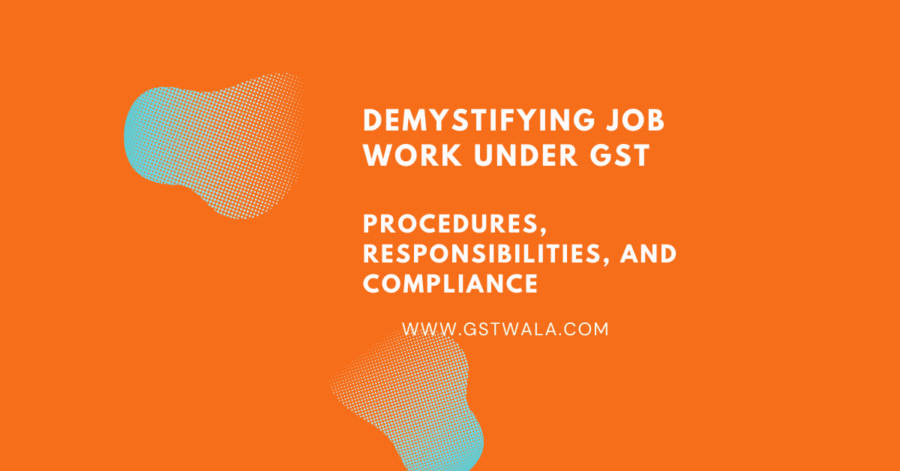
Demystifying Job Work under GST Procedures, Responsibilities, and Compliance
Job work under GST involves the processing of goods supplied by a principal entity. This concept has its roots in Central Excise, where major manufacturers could send inputs or semi-finished goods to job workers for further processing. Under the Goods and Services Tax (GST) Act, there are specific provisions for the receipt of goods for job work and their return after processing, without the payment of GST. These provisions benefit both the principal and the job worker. In this guide, we’ll delve into the intricacies of job work under GST, covering procedures, responsibilities, and compliance measures in detail.
Understanding Job Work: In simple terms, job work, as defined by section 2(68) of the CGST Act, 2017, refers to any treatment or process undertaken by a person on goods belonging to another registered person. The person conducting the job work is referred to as the job worker.
Job Work Procedure: The job work procedure under GST involves several steps, each crucial for smooth operations:
Dispatching Goods for Job Work:The principal sends raw materials or semi-finished goods to the job worker for processing, assembly, or completion. A delivery challan containing essential details such as goods description, quantity, value, and GST identification numbers of the supplier and the job worker must accompany the goods.
Updating Delivery Challan:Once the job work is complete, the job worker updates the delivery challan with details of the processed goods and sends it back to the principal.
Receiving Processed Goods: The principal receives the processed goods along with the updated delivery challan from the job worker, verifying the quantity and quality of the goods received.
Issuing Tax Invoice: If the processed goods are supplied back to the principal, the job worker issues a tax invoice containing necessary details such as names, addresses, GST identification numbers, description of goods, quantity, value, and applicable GST rates.
Paying GST: The principal pays GST on the value of processed goods supplied by the job worker at the applicable GST rate. If the job worker supplies the processed goods to a third party, they issue a tax invoice and pay GST on the goods’ value.
Claiming Input Tax Credit: The principal can claim input tax credit for the GST paid on raw materials or semi-finished goods sent for job work. However, the job worker cannot claim input tax credit for the GST paid on those materials.
Record Maintenance: Both the principal and the job worker must maintain accurate records of goods sent for job work, processed goods received, and tax invoices issued or received. These records must be retained for six years from the end of the financial year.
Responsibilities of the Principal: The principal holds several responsibilities in the job work process:
Issuing delivery challans for inputs or capital goods sent to the job worker.
Maintaining accounts of input and capital goods.
Informing the jurisdictional officer about the intended input goods and the nature of processing by the job worker.
Compliance Measures: Several compliance measures must be adhered to during job work:
Issuing delivery challans with requisite details before dispatching goods for job work.
Ensuring job work is completed within the specified timeframe.
Paying GST on processed goods received from job workers or supplied to third parties.
Filing Form GST ITC-04 on a quarterly basis to provide details of goods dispatched to and received from job workers.
Based on the extensive information provided regarding the rules and restrictions for claiming Input Tax Credit (ITC) under job work, as well as the case studies and frequently asked questions, here is a summary:
Sending Goods for Job Work:
Goods sent for job work must be accompanied by a challan containing specific details.
Information regarding the goods sent must be shown in GSTR-1 Form.
The principal must issue triplicate challans, one retained and two sent to the job worker.
Filing of ITC-04:
The principal must file ITC-04 to inform the tax department about goods sent for job work.
Details of inputs or capital goods sent for job work must be provided in the ITC-04 form.
E-Way Bill:
E-way bill generation is mandatory for interstate movement of goods for job work.
For intra-state movement, applicable threshold limits are to be considered.
Furnishing of Returns:
Quarterly return filing in Form GST ITC-04 is required summarizing details of goods dispatched to or received from job workers.
Specific details related to job work must be mentioned in GSTR-1.
Consequences for Non-Compliance:
Non-compliance with job work requirements may result in penalties, interest charges, seizure of goods, or prosecution.
Case Studies:
Detailed case studies illustrate various scenarios related to job work and provide interpretations based on GST laws.
FAQs:
FAQs cover a wide range of questions related to job work, including tax implications, procedures, responsibilities, and compliance.
In conclusion, adherence to the rules and regulations outlined for job work under the GST regime is crucial for businesses to avoid penalties and ensure compliance with the law. The provided guidelines, case studies, and FAQs offer comprehensive insights into the various aspects of job work and its taxation implications.
Job work under GST entails a systematic process with defined responsibilities and compliance measures. Understanding these procedures is essential for both principals and job workers to ensure seamless operations and compliance with GST regulations. Stay informed and compliant to leverage the benefits of job work under GST effectively.
For personalized GST solutions tailored to your business needs,
reach out to us at info@gstwala.comTop of Form
